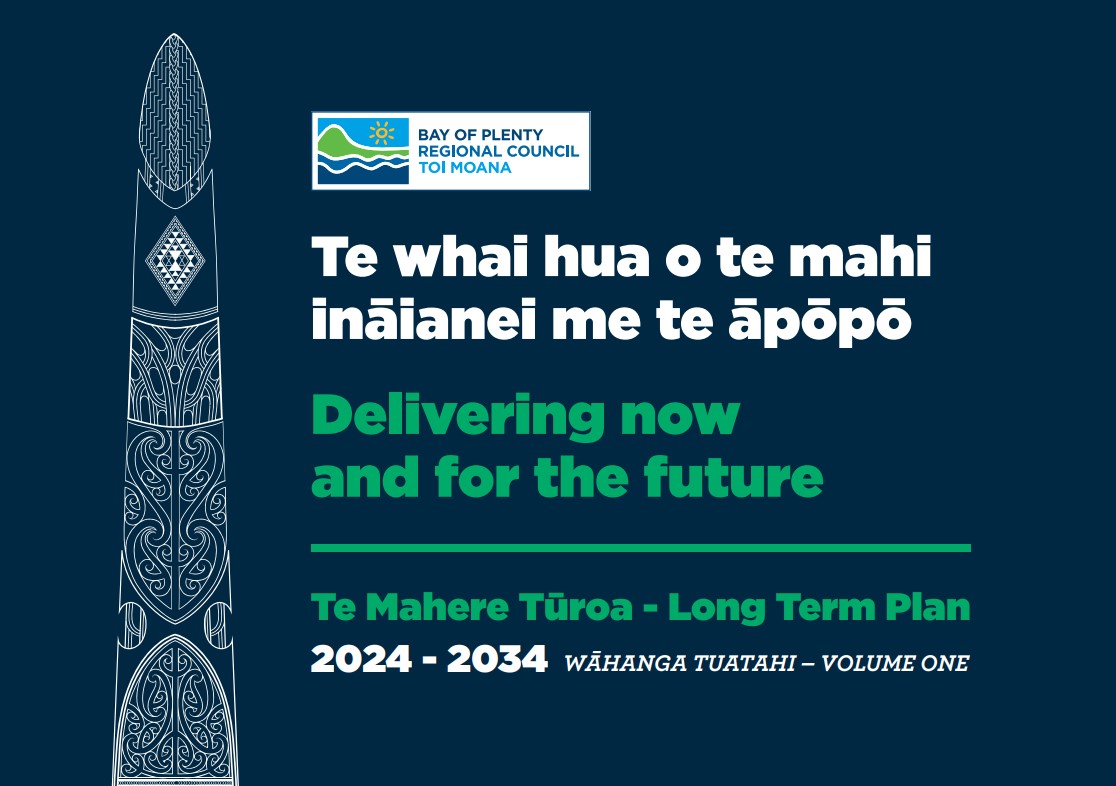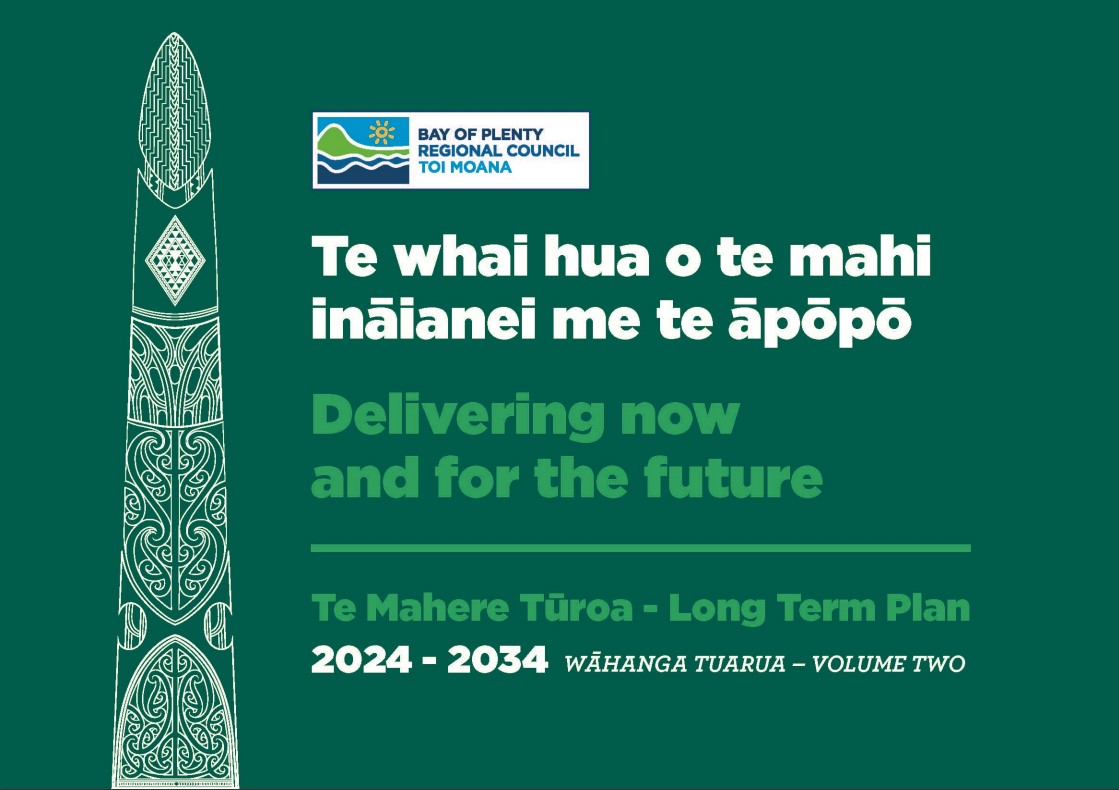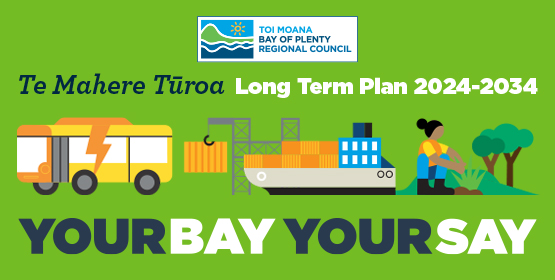The Long Term Plan 2024 – 2034 sets the budget and details the work that will be delivered for the next 10 years. The development of the Long Term Plan included comprehensive community engagement, with significant interest and input from ratepayers across the region.
Ō tātou whāinga ā-hapori | Our community outcomes
Ka ora te taiao, ka ora te tangata.
If we look after the environment,
it will in turn look after us.
This pou whenua (land marker) represents our five community outcomes. The base of the pou begins with he taiao ora (a healthy environment) to show the connection to the land and importance of a healthy taiao (the environment) for everything to thrive.
It then moves to outcomes connected to people and places and ensuring everything can thrive and is protected in our region. Te Ara Poutama sits at the top due to the kōrero tuku iho (narrative) it is based upon.
The pursuit of excellence inspires a commitment to innovation, excellence, and continuous improvement.
 |
Te Ara Poutama The Pursuit of Excellence The use of the poutama design represents the journey Tāne took to retrieve the baskets of knowledge to achieve a prosperous future for all. The rope is symbolic of a strong partnership underpinning success. |
 |
He hapori mata-hī awatea Future ready communities The niho taniwha (sharks tooth) design has been used to represent this outcome. Shark’s are revered for resilience, adaptability and the ability to never give up. This outcome is about remaining resilient for future generations. |
 |
Ngā hapori e honoa ana, e whakamanatia ana hoki Connected and enabled communities The whakarare design represents the interweaving of whakapapa (ancestry). It interlocks, showing strong and unbreakable connections within a community. |
 |
He whanaketanga mauri tū roa Sustainable development The kōwhaiwhai design includes mangōpare which represents the hammerhead shark. Mangōpare signifies strength, determination, and leadership as well as the connection between people and the environment. |
 |
He taiao ora A healthy environment This kōwhaiwhai design represents the healthy state of an environment that is teeming with life. |
Ngā whakatau matua | Key decisions
Consultation Topics
How should we fund Public Transport in urban centres across the region?
We proposed that rates funding for public transport in urban areas should be 90% from targeted rates and 10% from general rates.
After considering submissions on this topic, of which just over half were in support, Council confirmed the proposal. This recognises the region-wide benefits of public transport including reduced traffic congestion for all road users, lower regional carbon emissions and improved air quality, as well as public health and social wellbeing benefits.
Do you agree with our proposal to enable a managed sell down in our Port of Tauranga Limited shareholding to no less than 28%?
We consulted on a proposal to enable a managed sell down in the Port of Tauranga Limited shareholding from 54.14% to a minimum of 28%. Public feedback on the proposal was evenly split, and several matters were raised relating to the process for divestment.
After carefully considering these views, Council has decided to enable this managed sell down process. Before a sale can go ahead Council still needs to consider and approve the details of the process that will be followed and approve the conditions of any sale of shares.
Further detail is provided in our Financial Strategy which is included in Volume 2 of the Long Term Plan 2024-2034.
Should Regional Council investigate new opportunities for regional parks?
On 9 May 2024 the Noble family gifted land on Hot Springs Road, Katikati, to Council. This generous donation means that Council will not need to undertake all the investigations originally planned and has chosen to redistribute the initial budget of $450,000.
This means that the investigations for a Rotorua regional park will be allocated $250,000 and the Hot Springs Road property will be allocated $200,000 to fund capital works to ensure compliance with safety and environmental standards. An additional $50,000 per year will be budgeted for years 3-10 of the Long Term Plan for property management and maintenance for the Hot Springs Road property.
Other key decisions
A healthy environment - Ohau WallCouncil agreed to form a technical working group to assess potential solutions to repair the Ohau Diversion Wall in Lake Rotoiti. Any future changes to budgets and timing of the work will depend on the recommendations of this group and approval by Council. |
Sustainable development - Waste management and enabling a circular economy
|
Te Ara Poutama (The Pursuit of Excellence) - Te Amorangi (Māori Strategy) and Te Pae Tawhiti (Māori capability and capacity building)Council received a large number of submissions in support of Te Ara Poutama (Pursuit of Excellence) which is a new Community Outcome for the Long Term Plan 2024-2034. Through its deliberations, Council agreed the following changes to the draft Long Term Plan budget to support work to embed this outcome.
|
Future ready communities - Rivers and DrainageCouncil approved the addition of three rainfall gauges in the Waioeka Otara River catchments to improve flood forecasting for Ōpōtiki and will support improved community resilience to natural hazards. |
Connected and enabled communitiesCommunity fundingCouncil received a large number of funding requests through submissions to the Long Term Plan. Through its deliberations, Council agreed the following changes to the budgets for community funding.
Public Transport
|
Long term plan and supporting documents
Long Term Plan
 Te Mahere Turoa - Long Term Plan 2024-2034 - Volume One
Te Mahere Turoa - Long Term Plan 2024-2034 - Volume One
 Te Mahere Turoa - Long Term Plan 2024-2034 - Volume Two
Te Mahere Turoa - Long Term Plan 2024-2034 - Volume Two
Supporting Policies
Long Term Plan 2024-2034
- Find out more about the consultation and key dates
- Read all the submissions we received
- View the late submissions received
- Download and view the hearings schedule

Our stories
Te Pourepo o Kaituna wetland creation project
Wetlands play a vital role in our approach to climate change adaptation. They both capture and storing carbon greenhouse gases and they also provide resilience to hazards such as flooding, storm surge and coastal inundation.
Our rates story
Did you know that Bay of Plenty Regional Council rates differ from city and district council rates? Find out more the work we do across our rohe.
Protecting biodiversity
See how landowners and community groups are working to adopt land management practices that futureproof their land and livelihoods. Their work is also protecting and enhancing waterways and other natural areas.
Volunteers
Bay of Plenty Regional Council works with the community to protect our water, soils and our wildlife, and to manage or get rid of pest plants and animals.
